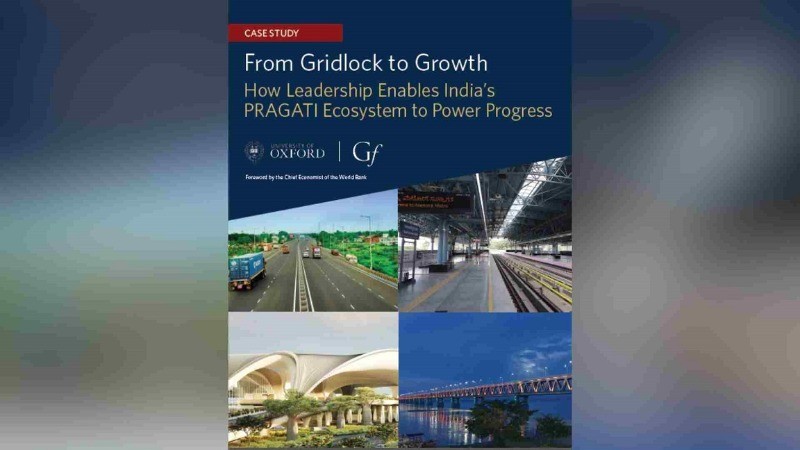
A recent case study by the University of Oxford has highlighted the remarkable impact of the Pro-Active Governance and Timely Implementation (PRAGATI) platform, introduced by Prime Minister Narendra Modi in 2015. Over its nine-year journey, PRAGATI has transformed India’s governance, especially in tackling stalled infrastructure and social development projects.
The platform has had a significant role in reviewing 340 projects worth INR 17.05 lakh crore ($205 billion) by the end of June 2023. Its focus on breaking bureaucratic gridlocks, resolving delays, and fostering cooperative federalism has reshaped India's project management landscape. The report, “From Gridlock to Growth - How leadership enables India’s PRAGATI ecosystem to power progress,” offers valuable insights into how PRAGATI has fast-tracked stalled projects and ensured their timely completion.
One of PRAGATI’s most notable successes is the Bogibeel Bridge in Assam. This rail and road bridge, which had been stalled for years due to land acquisition challenges and extreme weather, saw renewed momentum after PRAGATI’s introduction in 2015. With Prime Minister Modi personally reviewing the project, it was completed by 2018, drastically improving connectivity for Dhemaji district. The area had previously relied on dangerous boat services, and the bridge now offers safer, more reliable transport.
In Jharkhand, PRAGATI played a critical role in advancing the North Karanpura Thermal Power Plant. Stalled for years due to unresolved land lease issues and disputes between stakeholders, the plant’s construction gained momentum under PRAGATI’s intervention. Today, it supplies electricity to millions and creates jobs, benefiting local communities.
Similarly, the Bengaluru Metro Rail Project serves as another example of PRAGATI’s success. Delayed by approval bottlenecks, the project gained traction after it was brought under PRAGATI’s oversight. By coordinating efforts between central and state authorities, the platform significantly shortened the project’s timeline, enabling Bengaluru’s urban commuters to enjoy modern public transport services earlier.
Another achievement of PRAGATI is seen in the Dahisar-Surat section of National Highway 8. In Maharashtra and Gujarat, this highway expansion was delayed due to environmental concerns, particularly a stretch passing through the Sanjay Gandhi National Park. The project was stalled until PRAGATI facilitated a resolution in 2017, allowing the highway expansion to proceed with additional measures to protect the park’s wildlife.
Beyond infrastructure, PRAGATI has significantly impacted social sector programs. The Jal Jeevan Mission, which aims to provide tap water to every rural household, has seen remarkable progress under the platform’s oversight. In 2019, only 17% of rural households had access to tap water, but by early 2024, that number had surged to 74%, demonstrating PRAGATI’s effectiveness in speeding up crucial services.
The Swachh Bharat Mission, aimed at eliminating open defecation, also benefited from PRAGATI’s management. In just five years, over 100 million toilets were built, improving sanitation and reducing public health risks, particularly for women and children.
PRAGATI's influence is also evident in the Udhampur-Srinagar-Baramulla Rail Link in Jammu and Kashmir. This rail project had been delayed for years but gained momentum after being included in the PRAGATI platform. Today, it connects the Kashmir Valley with the rest of India, providing vital socio-economic benefits to the region.
A key factor in PRAGATI’s success is its reliance on digital tools. The platform integrates real-time data, drone feeds, and GPS tracking, allowing for accurate monitoring of project progress. For example, during the construction of the Dahisar-Surat highway, GPS-enabled tracking helped identify inefficiencies, enabling timely corrections. Additionally, centralized data dashboards and video conferencing have improved transparency and accountability, reducing reliance on outdated reporting systems.
The broader economic impact of PRAGATI has been substantial. Research by the Reserve Bank of India and the National Institute of Public Finance and Policy suggests that every rupee spent on infrastructure generates a return of 2.5 to 3.5 rupees in GDP. By accelerating project completion, PRAGATI has minimized cost overruns and ensured that the economic benefits of infrastructure projects are realized more quickly, improving access to education, healthcare, and employment opportunities for millions.